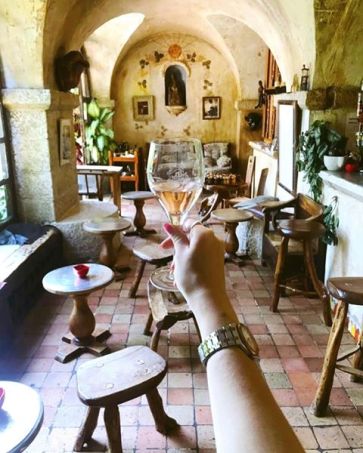The art of drinking well requires passion, presence, pleasure, education and mindfulness. Practice these, and you will experience the innumerable benefits that wine can bring into your life:
A deepening connection to cultural traditions where the drinking of wine is foundational.
An improvement in health.
The possibility of rich, sensory experiences.
Wine for culture
Part of the modern attack on traditional culture is the attack on rituals which unite people and create a sense of community and purpose. One element of this attack is the move away from the traditional table meal and towards fast food. Belonging begins at the dinner table; with food and drink that is savoured and amongst intimate, relaxed conversation. And central to the traditional table is the drink of wine.
Wine has existed for as long as human’s have domesticated animals and planted the first crops in the ground. From the earliest times, wine has had religious and spiritual connotations. The consumption of wine for ritual purposes has been common in Judaism since Biblical times. It was also used in ancient Greece and Rome in rituals which worshipped the gods Dionysus and Bacchus. Wine is used in the Christian faith as part of the eucharist to commemorate Jesus’s last supper.
Wine can be used to embolden conversation and make us feel connected at the dinner table. Inhibitions are slightly lowered, and people reveal a more intimate side to themselves. Some of the best conversation’s I’ve had have been over a glass of fine Bordeaux.
A quiet drink in a dimly lit room is the occasion where the most important and often socially taboo subjects are breached. This is the time to bring up religion, politics, society, love, sex, family, money, conspiracies and God. And it’s through giving air to these deeply held beliefs that we feel seen, heard and connected. There is no greater fusion than the art of food and wine meeting the art of conversation.

How to drink wine for pleasure
A good wine is like a gentle kiss, its effect throughout the meal is scintillatingly sensual in an elegantly understated way. –
Wine is one of the great sensory pleasures that you will experience. Like any form of art (literature, music, dance), the more educated you are and the more refined your senses, the more you will enjoy it. So my first advice for you on your journey to drinking wine for pleasure is to educate yourself.
Before you take your first sip – do some research. Where does the wine come from? What is the climate like there? What is the soil like? What is the philosophy of the vineyard? This information is an essential element of the story that reaches it’s conclusion in your glass. Wine is very influenced by the climate and mineral content of the soil in which is grown – and in that sense it’s a fantastic way to connect with the earth.
Wine is one of the great sensory pleasures that you will experience on this earth. Like any form of art (literature, art, music, dance), the more educated you are and the more refined your senses, the more you will enjoy it.
Secondly – honour your wine! Don’t drink it out of a dusty, fingerprint smeared glass. Use a clean and polished glass of the highest quality you can afford. Use the appropriate glass for the kind of wine you’re drinking. Hold the glass correctly – always from the stem. This is to avoid warming up the wine with your hand and changing the flavour.
Thirdly, be sure to engage all of the senses! Before you take your first sip, swirl it around and take a sniff. Try to make a list of all of the flavours you can detect. Look at the colour – this says a lot about how the wine was processed. We will be going deeper into wine processing in later articles. Then take your first gorgeous sip and be mindful of what you experience. I personally keep a wine diary to keep track what wines’s I’ve tried, ones I prefer and anything memorable about the flavour.
How to prevent alcoholism
I think it would be irresponsible to write about wine without addressing the issue of alcoholism. The perception of alcohol as a tool for getting inebriated is shallow and vapid. It’s very indicative of modern culture’s inability to control impulses and have a temperate attitude towards pleasures. Many people either use alcohol to get drunk or don’t trust themselves and abstain from it all together. But the elegant approach lies in between these two extremes.
A robust culture with connection to tradition is a protective factor in preventing alcoholism. Alcohol should be used as a supplement when there is already a strong foundation – health, meaning, purpose, family and community. When alcohol is used as a replacement for these things – that’s when you see alcoholism.
When my family get together – we eat and drink to say the least! But once the dinner plates have been cleared, someone pulls out a guitar or dusts off the piano and we begin to sing old folk songs and recite poetry. Sometimes everyone knows the words (some members will have been playing the same songs for decades) and we all sing along.
This is not the kind of vapid drunkenness common in lost and destructive inner city youths. This is a drunkenness that expresses a greater meaning and purpose – connected to the songs and stories that bind us across time and space, that were sung to us from birth. A drunkenness that is in touch with the culture and traditions that we owe our existence to.
As Roger Scruton puts it, the dispossessed ‘drink to fill the moral vacuum generated by their culture, and while we are familiar with the adverse effect of drink on an empty stomach, we are now witnessing the far worse effect of drink on an empty mind’ (Roger Scruton, I drink therefore I am).
The art of wine requires an important balance of passion and mindfulness. I believe that wine has a place at the dinner table that is both cultural and spiritual (all while adding an essential culinary element to a meal). To use wine to ‘party’ or as mere escapism is disrespectful to the civilisations who used wine as a gateway into their culture. So please, enjoy your drink! But the secret to the art of drinking well is to do it with pleasure and mindfulness.
Stay tuned for part two: how to drink wine for health.
